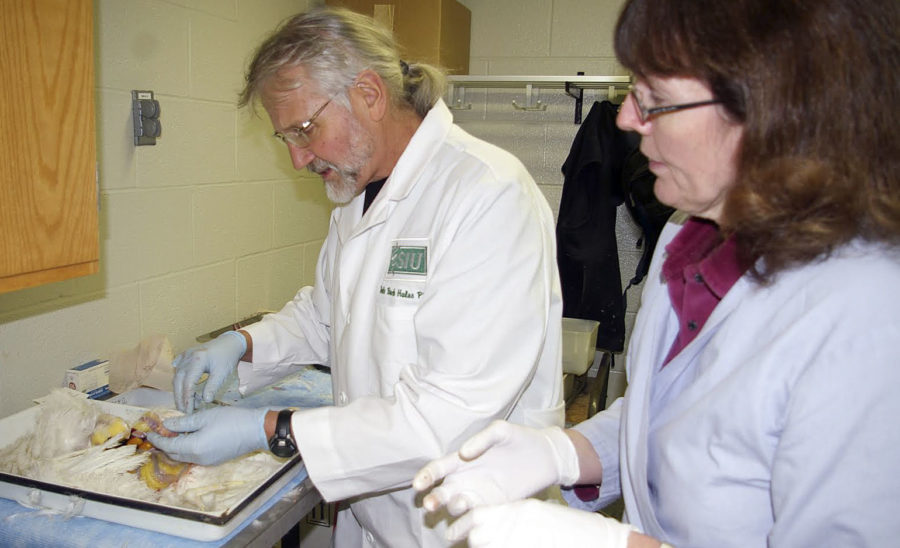Results of flaxseed feed study may lead to cancer prevention in humans
March 1, 2016
It’s no secret that what and how much people eat has a direct correlation to their weights — the effects can be observed as their guts protrude and favorite jeans get tighter. But it is the unseen that presents the greatest health threats.
The development of various cancers and excessive fat in the liver cannot be observed, but are directly affected by what people put into their bodies.
Physiology professor Dale B. Hales has been conducting research at SIU to explore how dietary intervention works to lessen the severity and incidence of ovarian cancer.
Advertisement
In a study where hens were fed a diet of flaxseed — a source of omega-3 fatty acid — at the time of their first lay, Hales found that ovarian cancer occurred in the group that was fed flaxseed less often than in the group that wasn’t. For the chickens that were fed flaxseed and still developed cancer, their symptoms were less severe.
Chickens spontaneously develop ovarian cancer the way humans do, which makes them a good laboratory model for exploring ways to detect ovarian cancer at an early stage.
Hales fed another group corn oil, a source of omega-6 fatty acid, and found it had a negative effect, causing ovarian stress and increasing their likelihood of getting ovarian cancer.
“That’s like the McDonald’s diet,” Hales said. “It’s bad stuff.”
The ratio between omega-3 and omega-6 fatty acids is an important variable in a lot of diseases, said Jeremy Davis, associate professor of animal science, food and nutrition. The ratio should be about three parts omega-6 and one part omega-3, but the ratio in the average American is about 17:1.
“Flax is a way you can kind of shift that ratio,” Davis said.
There is a direct link between the number of times an animal ovulates and ovarian cancer, Hales said. Since chickens ovulate every day, after about two years incidents of ovarian cancer become noticeable. By the time a chicken reaches this two-year mark it has ovulated roughly the same number of times as a woman going into menopause.
Advertisement*
Every time an animal ovulates a tear is made in the surface of the ovary, and then the ovary has to be repaired, Hales said. The constant tear and repair cycle inflames the ovary and creates a very pro-carcinogenic environment.
Hales found the omega-3 in flaxseed works to reduce the inflammation, but it is not the only component at play. The antioxidant SDG, which is also present in flaxseed, blocks the negative effects of estrogen and promotes the metabolism of estrogen into a form that is not conducive for cancer growth.
“The governing hypothesis is the two components work synergistically to combat cancer,” Hales said.
Hales and Davis combined to conduct a study where more than 1,000 chickens were fed a diet of flaxseed. Davis analyzed the conditions of the livers to inspect the development of nonalcoholic fatty liver disease, while Hales gathered more data on how flax affects the ovaries.
Davis’ analysis found that whole flaxseed promotes healthy liver function. Lower levels of fat and reduced inflammation could be seen; however, how flaxseed works is still unclear.
“There is certainly promise with whole flax,” Davis said. “It also goes to say eating whole foods and things like that is probably a better decision-making process for the normal person.”
Hales found that flaxseed reduced the severity, but it did not reduce the incident in older hens, which led him to discover a window of opportunity for successful treatment.
“If you start with the anti-inflammatory diet at the right time it can lead to prevent cancer,” Hales said.
As of right now, there is no good way to detect ovarian cancer early, Hales said. Stage one ovarian cancer is curable about 95 percent of the time, he said, while stage four is curable less than 20 percent of the time.
There are also no drugs on the market to combat fatty liver disease, which makes flaxseed an important prevention option for abnormally susceptible people, Davis said.
After having such positive results in chickens, Hales teamed up with colleagues at the SIU School of Medicine in Springfield to conduct clinical trials. In one of these trials, which started a year ago, women who have gone into remission from ovarian cancer are fed 20 grams of flaxseed daily in the hopes that it will significantly postpone or prevent reoccurrence.
“It’s been interesting to use dietary intervention to try to prevent and treat a disease,” Hales said. “It speaks a lot to the potential in people, if they were more nutritionally aware they could reduce diseases significantly.”
Tyler Crotzer can be reached at [email protected] or 618-536-3325.
Advertisement









